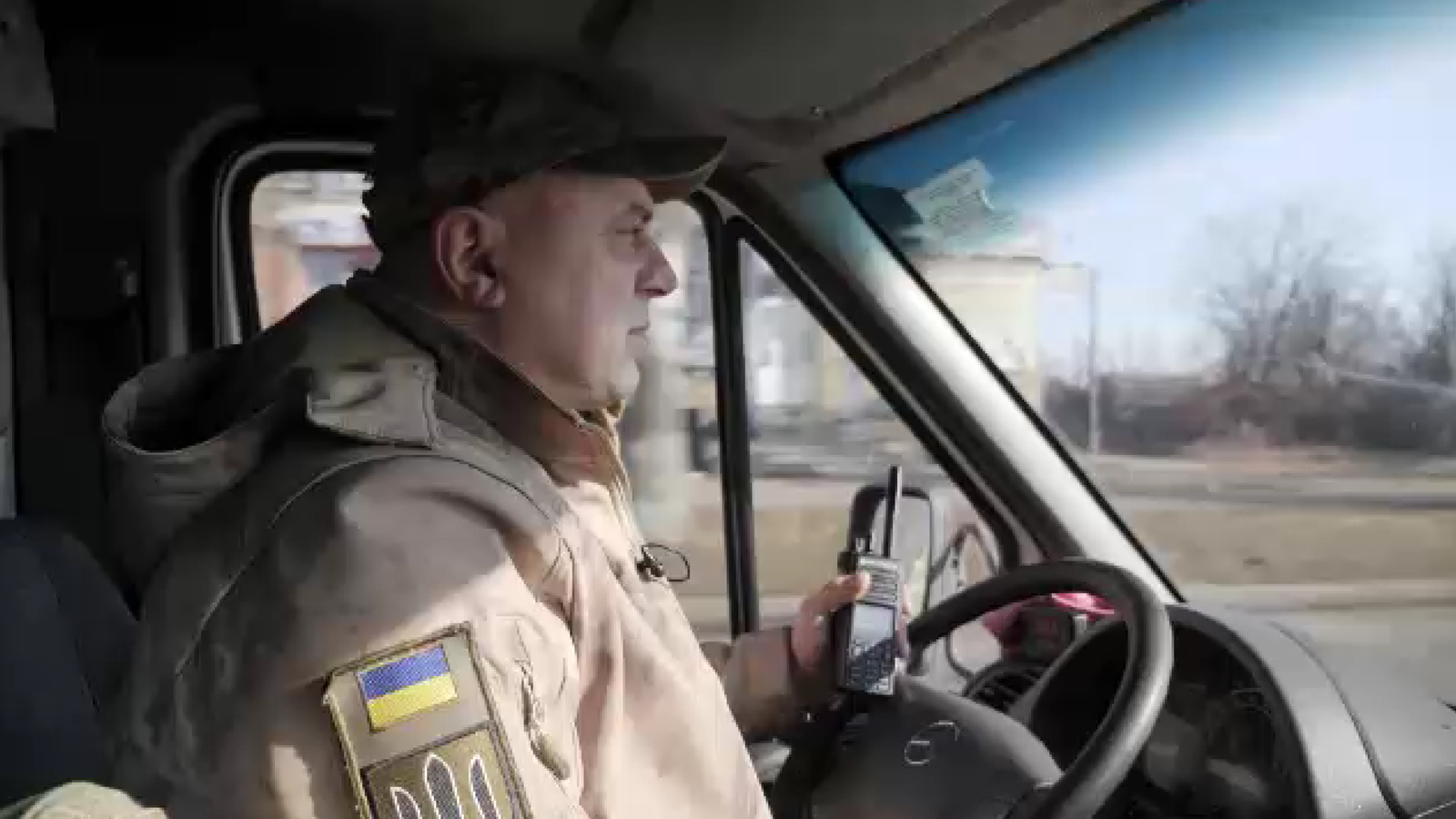Dealing with death is the grimmest reality of war – something few understand better than Taras.
The sergeant is part of a unit tasked with collecting the bodies of Ukrainian soldiers killed in action from morgues near the frontline and delivering them back to their families.
“I try to return our fallen warriors home as soon as possible,” Taras, 44, told Sky News as he drove his lorry through the city of Kramatorsk in eastern Ukraine.
“Their relatives need to say goodbye and bury them as it should be. So, that is my mission.”
It is a relentless cycle for him and the rest of the On The Shield team as Ukraine battles wave after wave of Russian attacks along the frontline across the Donetsk and Luhansk regions.
Russia’s committed ‘crimes against humanity’ – follow latest updates on the war
The Ukrainian authorities have not released figures of their war dead, but Western officials have put the number at more than 100,000 killed and injured since Russian President Vladimir Putin launched his full-scale invasion on 24 February 2022. The Russian toll is even higher, with the United States most recently saying the death toll alone was some 188,000.
Just one morning spent with Taras offered a sense of the scale of Ukraine’s loss.
He collected the bodies of 22 soldiers from two morgues alone.
Taras said seeing first-hand the price that his country is paying can become too much to bear.
“Sometimes I can’t sleep because of the young boys and girls,” he said.
“Sometimes I cry – like any normal person. Sometimes when I get back to our base, I am just lying there thinking and crying.”
Read more:
Top Gun immortalised fighter jets, but there are better ways to help Ukraine win this war
Yet he puts on a brave face when greeting other members of the Shield team – part of the Ukrainian armed forces – as well as workers at the morgues and the medics, who retrieve the fallen from the battlefield and transport them to the frontline body-holding facilities.
They exchange greetings and hug.
Asked how he managed to keep smiling when dealing with death every day, Taras said: “It’s hard but we try to find a moment to smile. I call home, talk to my wife, to my children, parents, brothers. After that, my heart is warm and I want to smile.”
At the first morgue we visited with Taras in Kramatorsk, four bodies were waiting, each in a white, plastic body bag, with the name and date of birth of each of the deceased written in marker pen, where known.
The purpose of On The Shield is to return the military dead with dignity to their loved ones.
Working with officials at the morgue, the first two body bags were carefully carried forward and unzipped.
The face of one of the soldiers had been partially ripped off. A morgue official said the injuries had most likely been caused by an artillery shell.
There was no obvious sign of injury on the second soldier. He looked to be in some kind of frozen sleep. The same morgue official said he had been killed by the blast wave from an explosion. Both men died fending off Russian attacks around the area of village of Bilohorivka in Luhansk, where fierce fighting is raging.
Taras bent over the bodies in turn and took a photograph as part of the trail of evidence.
Identity papers are also checked, such as passports and ID cards.
The bags were then zipped up and transferred to the back of his lorry. Then the next two body bags were brought out.
The date on one of those bags – 8 February 1996 – revealed that the soldier it was holding would have been celebrating his 27th birthday. He was found with a military flag from his air assault brigade unit. The flag was folded up neatly, put into a plastic bag and placed on his torso before the body bag was zipped back up.
Please use Chrome browser for a more accessible video player
A combat medic, who had brought the dead soldiers back from the battlefield, said it was clear that a new Russian offensive had already started.
“You can sense it because the frontline is not far from here. This is audible,” he said.
Asked whether he was seeing a concurrent rise in the number of dead soldiers being collected, he said: “It is not so relevant because we can’t always retrieve them from the battlefield because the aggressor does anything [to stop us]…
“Those bodies brought here do not reveal the true situation. We only bring the bodies that we can pull out. We can bring some out, but not all of them.”
With four bodies in the back of his lorry, Taras moved to a second morgue in the nearby city of Sloviansk. There, 15 bodies were already waiting to be collected, many in black rather than white plastic body bags. Four more then arrived in two military ambulances.
The body collector and other workers methodically processed the majority of the dead, with help from a young woman called Margo who oversaw the morgue.
Please use Chrome browser for a more accessible video player
She said the number of fallen soldiers passing through varied by day. The highest number in a 24-hour period was 43.
“It does impact me, strongly,” she said, sitting at a small makeshift desk, where she signs off paperwork for each body.
“When I am taking documents and open them and see the date of birth, my tears are welling up from inside me. It is hard to keep myself composed. It is very hard.”
A military paramedic who gave her name as Lina was at this morgue, having helped retrieve some of the fallen from the frontline. She was in a rush to return to her unit.
“In our direction, it is pretty tense,” she said. “My guys are dying at this very moment and they need my help.”
Lina raced off to a waiting vehicle and left.
For Taras, his next stop was the much larger city of Dnipro, about a four-hour drive north. Two more On The Shield drivers, operating in other parts of the eastern frontline, also had collected bodies that morning and were heading in the same direction.
The bodies are transported to the main Dnipro morgue or two other morgues in the vicinity, where the military has established large, refrigerated lorries to be able to handle the volume of death rotating through.
Forensic experts at these facilities examine each body to determine the cause of death. Finally another member of the Shield unit transfers each fallen soldier to their respective families via recruitment centres in their local area anywhere in the country.
Please use Chrome browser for a more accessible video player
Colonel Vladyslav, 42, the commander of the whole unit, urged the UK and other Western allies to give Ukraine more weapons and ammunition to bolster their capabilities and reduce the number of future losses they incur against Russia.
“The best men die for this war,” he said, speaking in good English, standing outside the Sloviansk morgue.
“We protect our country – that is obvious – but we do not have as many troops as Russia. Therefore, it’s most important to move on to victory as fast as we can.”





